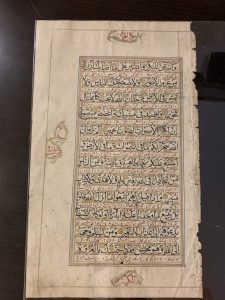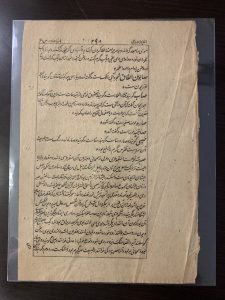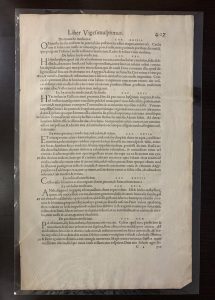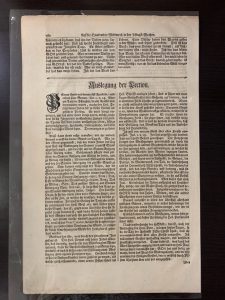McFarlin Library Special Collections is home to an extraordinary diverse and old narrative. Some dating back as far as 1207 CE, such as our original leaf from the Koran. The writer spent 22 years of his life working on the book in which this leaf originated from. To be specific, the work was finished at 4pm on March 22, 1207. The red lettering is in Persian, the black words are Arabic, and solid gold leaf is exhibited on the the page. This book was found in Tehran, Iran in 1952.
Another original leaf included in our collection is dated 1277 CE. This book portrays the principles of Islam as interpreted by the Shaafi belief. In addition to discussing the principles of the Islam religion, such as fasting, praying, zaaka (giving money to the poor), and hejah (visiting Mecca), it also discusses questions in regards to birth, courtship, marriage, divorce, and death specifically according to the Shaafi belief. This page is hand lettered and was found in Egypt.
As well as religious pages, we also house pages on varied subjects of natural history. For Plinius, this included the property of eggshells (which he stated could not be broken when stood up vertically), the advantages and disadvantages of wine drinking, and medical qualities of various herbs, flowers, and berries. Plinius also includes remedies for ailments such as chronic ulcers, convulsions, and stomach pains (in which he prescribes copper granules stewed in wine), as well as ulcers and nervous pain (in which he prescribes honey for its natural antiseptic qualities). This original leaf is dated 1563 CE and is written in Latin.
Our library also includes unique items, such as an original page of a Catholic Bible dated 1701 CE and printed in Strasburg, Germany. This page is made of rags and can be washed and starched. The ink will not run.
If you would like to explore our Medieval-era manuscripts and incunabula, Special Collection is located on the fifth floor of McFarlin Library. We are open 8-4:30pm. If you would like to explore any other part of our collections, we are open to questions at speccoll@utulsa.edu




